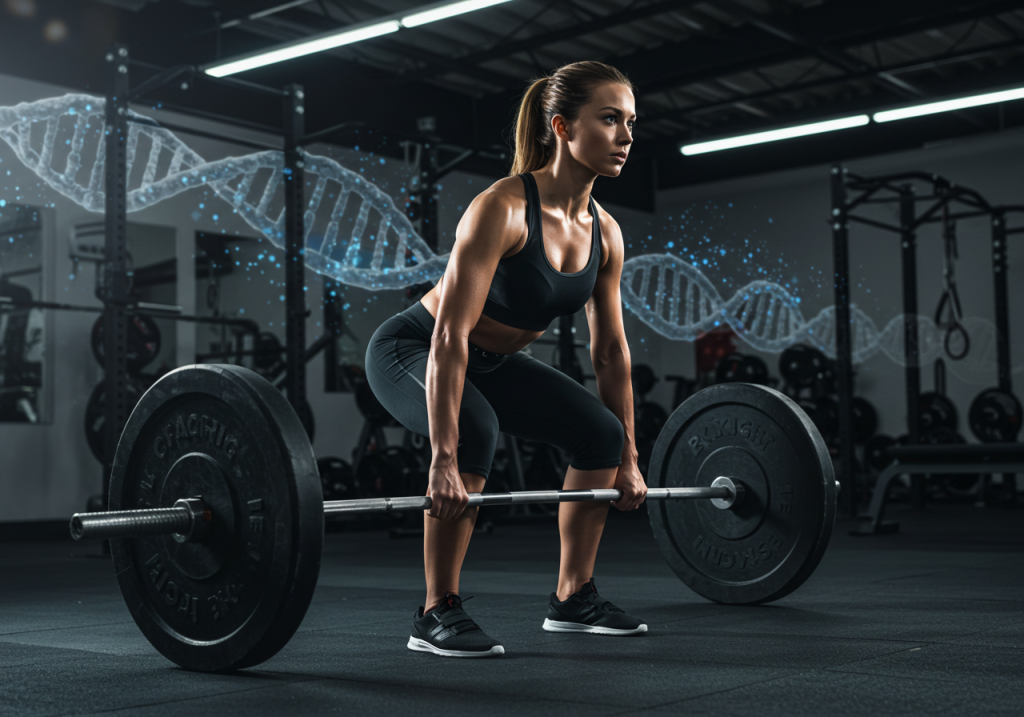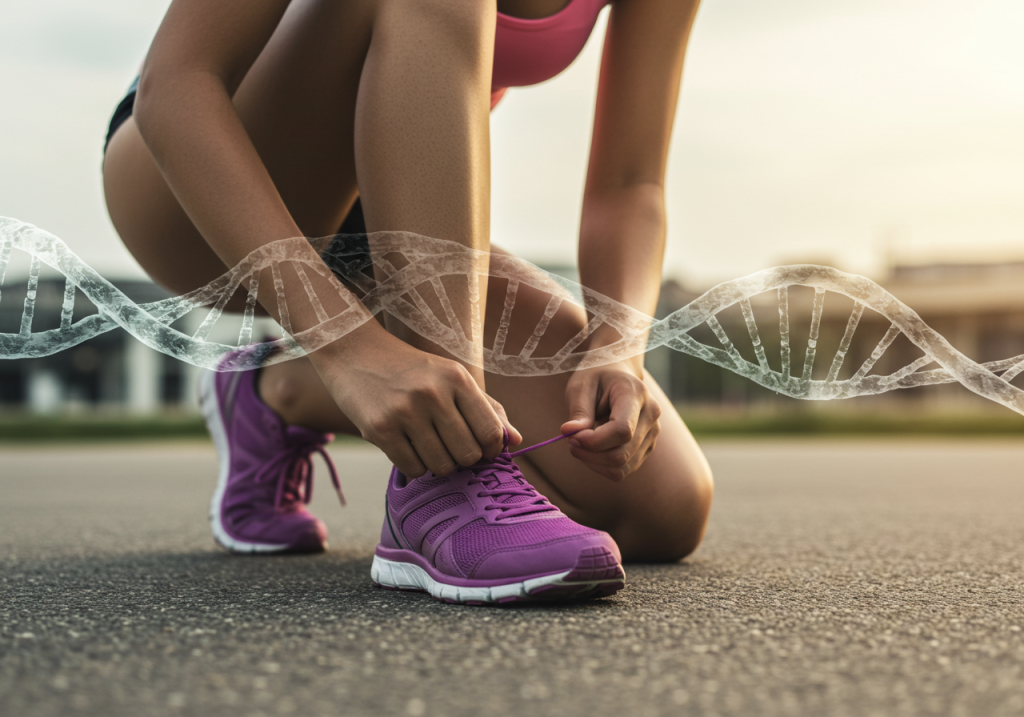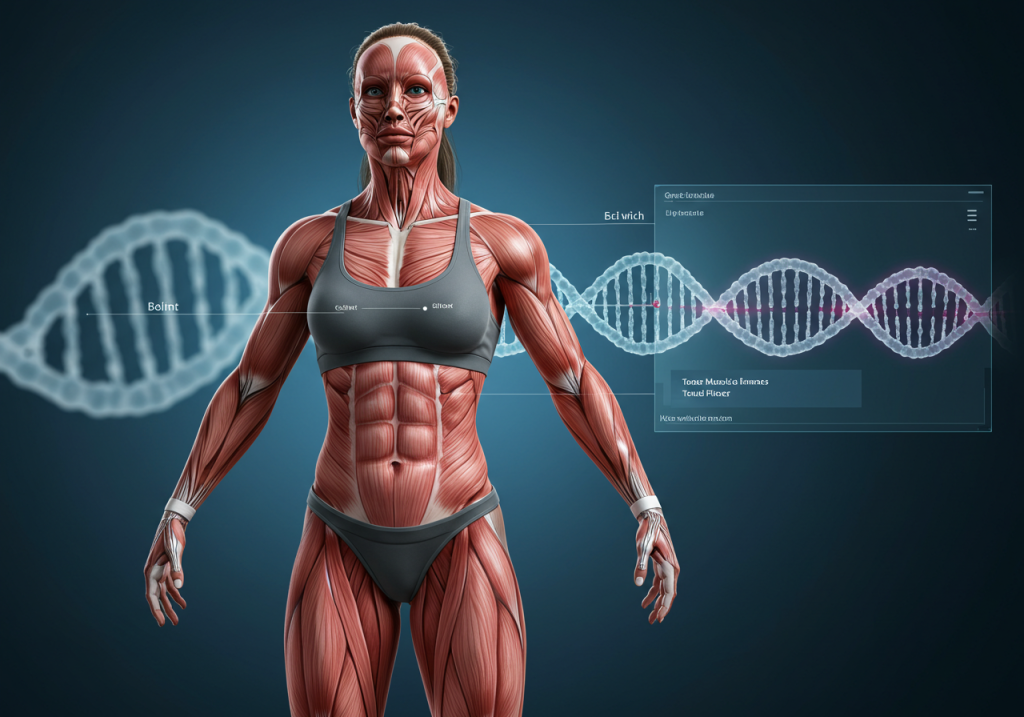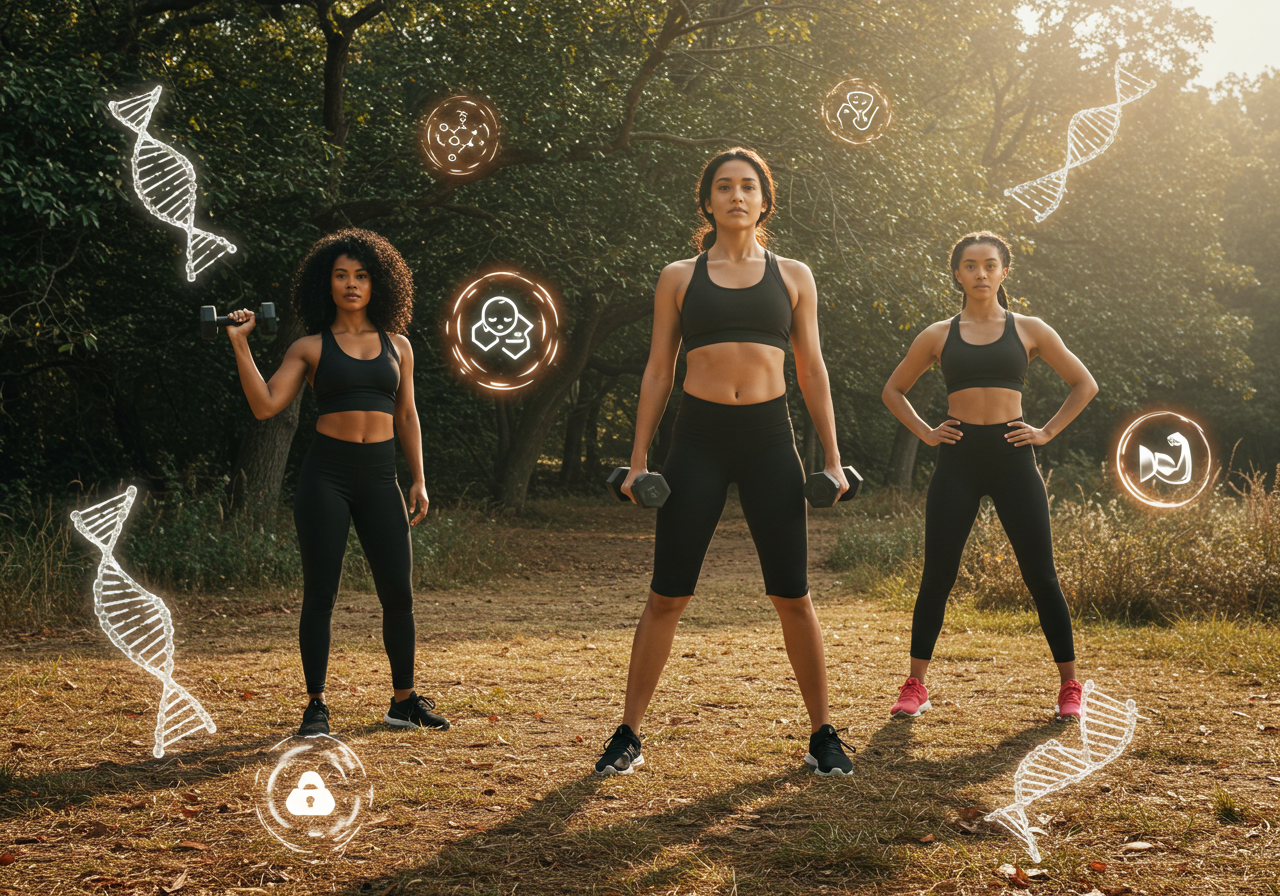What Role Does Genetics Play in Fitness?

Think of it this way: if your ancestors were marathon runners, there’s a strong chance that your cardiovascular system is equally efficient. This could make you the person who can easily keep up during long-distance runs, while your friend might be struggling after just a mile. It’s not just about mental toughness—your genetic makeup plays a crucial role in determining your athletic capabilities. So, what role does genetics play in fitness? A significant one, as it sets the foundation for how your body performs.
Have you ever noticed that some people seem to build muscle with minimal effort? Genetics influences how your body recovers and grows muscle after intense workout sessions. Consider the analogy of baking cakes with different recipes; some rise beautifully, while others fail to rise at all. Similarly, your genetic structure determines how your muscles respond to training, making muscle growth more or less efficient. This is just one example of how what role does genetics play in fitness goes beyond simple dedication.
Additionally, your genes influence your susceptibility to injuries. Think of a house built with solid materials that can endure harsh weather conditions, versus one that crumbles after a gust of wind. People with a genetic predisposition for strong ligaments and joints tend to push their physical limits with a reduced risk of injury. This is yet another way genetics shapes your fitness journey.

While hard work and commitment are fundamental to achieving fitness goals, it’s truly fascinating to see how your genes provide the underlying framework for your athletic performance. Genetics is not just a bystander in your fitness journey, but a major player in how you build strength, endurance, and resilience.
Beyond the Gym: How Your DNA Shapes Your Fitness Potential
Your genetic makeup plays a significant role in determining how quickly you can build muscle, your metabolic rate, and how well you recover after a strenuous workout. Have you ever observed how some individuals can sprint at full speed and recover almost instantly, while others feel exhausted after a light jog? This difference is not solely a result of effort; it’s heavily influenced by your genetics. Some people are naturally inclined towards endurance sports, while others may be better suited for strength training—it’s all determined by your genes!
Incorporating genetic insights into your fitness routine offers a powerful advantage. Personalized workouts, designed to align with your DNA, can enhance both your training and recovery processes. What role does genetics play in fitness? A crucial one—by using genetic testing, you can uncover the workouts that are best suited to your body’s natural strengths. It’s like finding a shortcut on your fitness journey, where you no longer have to experiment to determine what works best for you. With a better understanding of how your body performs, you can optimize your fitness plan with precision and effectiveness.
Genetics and Gains: Unlocking the Secrets of Your Inherited Athletic Ability
When we explore the science behind genetics and fitness gains, it’s truly remarkable how specific genes influence factors like muscle fiber composition, oxygen uptake, and even recovery time after intense workouts. Imagine being born with a turbo engine instead of a standard one—that’s what having advantageous genes can feel like in the world of athletics! For example, individuals with a higher proportion of fast-twitch muscle fibers tend to excel in sprinting and power sports, while those with more slow-twitch fibers are naturally better suited for endurance and long-distance activities.

However, here’s the twist—what role does genetics play in fitness? While genetics provide a foundation, they don’t determine your athletic future. Just like a gardener can nurture a small seed into a thriving plant, anyone can enhance their athletic abilities with the right training and mindset. Epigenetics, the study of how your environment influences gene expression, reveals that your lifestyle choices can activate the right genes for strength, endurance, and recovery.
So, if you feel like your fitness journey is more challenging than others, remember that everyone starts with their own unique genetic blueprint. Your genes set the stage, but it’s what you do with them that truly matters. With determination, consistency, and a well-planned strategy, you can harness your full potential and unlock new levels of performance. The key is to embrace the journey, knowing that what role does genetics play in fitness is just one piece of the puzzle!
From Couch to Champion: Can Your Genes Guide Your Fitness Journey?
Think of your DNA as the blueprint for your personal fitness journey. Some individuals might inherit genes that give them an advantage in endurance sports, while others may be naturally gifted with muscle fibers perfect for powerlifting. But don’t get discouraged—genes are not the final word in determining your fitness level. They’re just the starting point, much like the engine of a car—you still need the key to get it moving.
So, are you destined to stay a couch potato forever? Not at all! It’s important to remember that lifestyle choices play a significant role in shaping your fitness potential. When you combine your genetic traits with determination and healthy habits, you’re setting yourself up for success. Ask yourself: are you fueling your body with the right nutrients? Are you incorporating both cardio and strength training into your routine? That’s where the magic lies in achieving results!

ature vs. Nurture: The Genetic Blueprint Behind Fitness Achievements
Nature, the genetic aspect of the equation, lays down the fundamental blueprint for fitness. Some individuals are born with a specific bone structure, muscle density, and metabolic rate that can give them a head start toward fitness success. Imagine having the ideal ankle flexibility for a perfect jump shot or lung capacity that turns running a marathon into a light jog. These genetic advantages can offer a significant edge, much like having a high-performance engine in a car.
But here’s where it gets fascinating: nurture—the environment and the choices we make—also plays a vital role in shaping our fitness outcomes. Consider two siblings—one excelling as a star athlete and the other stuck on the couch. Could it be that the athlete had access to sports teams, encouragement, and proper training, while the other spent most of their time on video games? Our social environment, education on nutrition, and motivation all play a huge role in shaping our behavior. It’s like cultivating a garden—you may have the best soil (genes), but without water, sunlight, and care, those plants won’t grow to their full potential.
So, while nature may provide you with the seeds of greatness, nurture is the gardener that ensures those seeds thrive. What role does genetics play in fitness? It’s just one part of the equation, and the true magic happens when genetic gifts meet the effort, dedication, and resources you bring to your fitness journey. It’s a dynamic blend of both nature and nurture, where hard work and the right environment allow you to maximize your potential.

Muscle Mapped: How Genetic Variations Influence Workout Results
Isn’t it fascinating? Imagine two friends hitting the gym together; they follow the same workout routine and eat the same diet. Yet, one emerges as a sculpted powerhouse, while the other barely sees any difference. This disparity is often driven by genetic factors. Variations in genes related to muscle fiber composition can significantly influence how we build strength and respond to workouts. For example, some individuals may have a higher proportion of fast-twitch muscle fibers, making them excel in sprinting and weightlifting, while others may have more slow-twitch fibers, making them naturally better suited for endurance activities.
But it’s not just about muscle fibers. What role does genetics play in fitness? A big one—our genes also impact how efficiently our bodies recover after intense workouts. Have you ever felt sore for days, while your workout partner was back at it the next day? This difference might be linked to genetic variations that affect how the body handles inflammation and repairs muscle tissue after strain.
Furthermore, your genetic makeup plays a crucial role in how your body absorbs and utilizes nutrients. It’s akin to having a personalized fuel system; some individuals thrive on a protein-rich diet, while others perform better with more carbohydrates. So while workout plans and diets are helpful for everyone to some degree, understanding your genetic predispositions can help you fine-tune your approach for optimized results. By leveraging your genetic information, you can create a fitness strategy that aligns with your body’s natural tendencies, maximizing your progress and improving your overall performance.
DNA and Dedication: The Intersection of Genetics and Peak Performance
Genetics can certainly give us a head start. Think of it like wearing the perfect pair of running shoes—if they fit well, you’re already on your way to outrunning the competition. Some individuals are genetically designed for endurance, while others are built for speed. However, here’s the catch: genetics alone won’t carry you to the finish line. Just as a high-performance car requires fuel to unleash its potential, athletes need dedication to fully unlock their genetic advantages. It’s the combination of natural ability and unwavering hard work that makes all the difference.
Let’s explore this further. Consider a dancer, for example. They might have inherited the perfect genes for flexibility and grace, but without hours of practice and the relentless pursuit of perfection, that potential would go to waste, much like a masterpiece gathering dust in an attic.
Now, imagine a sprinter who doesn’t possess the ideal ‘fast-twitch’ muscle fibers, yet commits to training day after day with fierce dedication. Their persistence often outweighs raw talent, transforming them into a fierce competitor. It’s the classic story of the tortoise and the hare—slow and steady, driven by hard work, can indeed win the race.
So, when it comes to peak performance, both DNA and dedication are crucial components. What role does genetics play in fitness? It lays the foundation, but the true magic happens when that genetic potential meets consistent effort and determination. It’s a thrilling blend of nature and nurture, where every athlete’s journey is shaped by the intricate dance between genetic gifts and the hard work they put in.

The Genetic Factor: Are Some People Just Born Fit?
Imagine your DNA as the blueprint of a house. Some blueprints are designed for stability, while others are optimized for flexibility. The genetic factor can significantly influence how your body builds muscle, recovers from workouts, and processes nutrients from food. Fascinating, right? Research has shown that what role does genetics play in fitness? It impacts how efficiently our bodies utilize oxygen, burn calories, and even how prone we are to certain conditions. So, when you see a friend who can devour a pizza and still maintain a toned body, it might not just be their willpower — their genetics could be giving them a helping hand.
But hold on! That doesn’t mean that if you weren’t born with these “fit genes,” you’re out of luck. Think of it like baking a cake. Even if you don’t have the best ingredients, with the right techniques and some effort, you can still create something delicious. Your lifestyle choices, like regular exercise and a balanced diet, can have a huge impact on your fitness journey, regardless of your genetic starting point.
So, while some may have been fortunate with their genetic makeup, it’s important to remember that dedication and hard work still play a crucial role in achieving your fitness goals. After all, the path to becoming fit isn’t just about your genetics — it’s about passion, determination, and unlocking the potential of your unique body.




